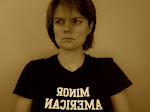Brian Allen Carr was nice enough to respond to my post in the comments section under the previous post. He makes the point that he was asked to review a book that had "Innovative" stamped on it. Fair enough.
I guess my whole beef is with the narrow understanding of innovation in general. It seems like books in the US are labeled "innovative" or "experimental" where in Germany, for instance, (and only because I am somewhat familiar with German bookstores) these books would simply be called literature. I mean, shouldn't writers always be thinking about whether or not the form they are using is the right one for the 'content' they are working with? In other words, shouldn't anyone writing a novel (or anything for that matter) be thinking about HOW to write it best? The US publishing world favors a certain kind of realist prose, and calls that "fiction" or "literature," and writing that comes out of another kind of literary tradition, if it is not foreign, gets labeled "innovative" or "experimental." These two terms, then, become labels for everything that isn't, for example, Alice Munro and Robert Ford.
To quote the FC2 website: "In his New York Times Book Review "Guest Word" of Sept 15, 1974, Sukenick described the group's aim to 'make serious novels and story collections available' and 'keep them in print permanently.'" In other words, Suckenick and others create FC2 in order to create the possibility of publishing prose other than, to change the old Charles Bernstein term, Official Prose Culture. But I am wondering if we aren't both operating (Carr and I) under a too narrow view of "innovation." The OED defines "innovative: 1. a. The action of innovating; the introduction of novelties; the alteration of what is established by the introduction of new elements or forms. {dag}Formerly const. of (the thing altered or introduced)." It seems like innovative becomes rigid and prescriptive as well: 'did you mess with your sequencing of the narrative? etc.' It seems like a working definition that is more generous to what most writers are doing is the second half of #1: "the alteration of what is established by the introduction of new elements or forms.' Recombinations, in other words. And to toot my own horn, I think I could argue for my work being innovative in this way. I mean, I don't think that Thomas Bernhard ever wrote a lesbian sex scene. If I am wrong on this, let me know. It seems like old technique applied to new content is a kind of innovation.
Wednesday, July 15, 2009
Subscribe to:
Post Comments (Atom)


5 comments:
Hi Magdalena & Friends,
For an excellent perspective on the innovative vs. realist opposition in contemporary fiction, you might want to check out Zadie Smith's essay in the NYRB, "Two Paths for the Novel."
http://www.nybooks.com/articles/22083
Before everyone goes, "Oh, no Zadie Smith!" let me just say:
(a) she's a surprisingly wonderful critic;
(b) she changes the terms of the debate by talking about "lyrical realism," on the one hand, and a nameless other trajectory, which is philosophical, anti-"authenticity," and counter-realist but still full of the pleasures that come with so much narrative prose;
and
(c) her core example for the latter is Tom McCarthy's brilliant novel, Remainder, which I can't recommend enough.
Yeah well, Brian Allen Carr might want to check out my latest perspective on his bullshit HERE.
UP YOURS!
CAConrad
WELL, Ron Silliman has made known how HE feels about this Brian Allen Carr BULLSHIT! Click HERE and scroll down, scroll down, scroll down, and you'll see it. You'll see "NOT THIS" in particular.
CAConrad
form vs. content, that old tyrannical divide pertaining to "innovation" and "radicalism".
why choose?
categorically these terms will cause people to grapple. but grappling with categories is not the meat of reading. it may not even be the meat of criticism.
i like that in germany everything is just literature.
the hungarian woman who worked at the cody's in sf before it closed down always made a point to have a little conversation with me whenever i went in to buy a book by bernhard or proust. i enjoyed our little conversations. they were about literature.
maybe these categories are all just market-defined in the u.s.
congratulations on the lambda.
Thanks for sharing....
___________________
Susana
Online Marketing of your brand
Post a Comment